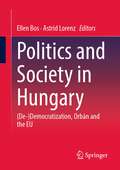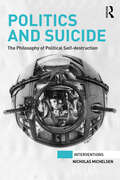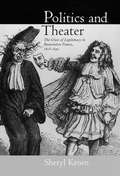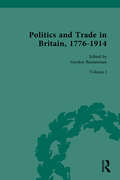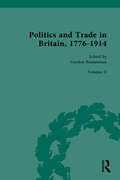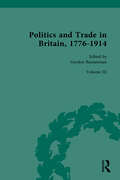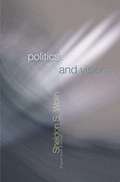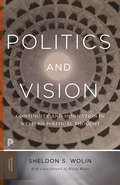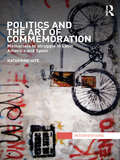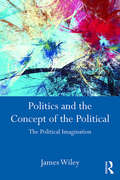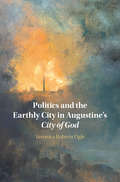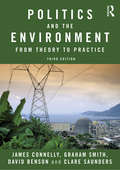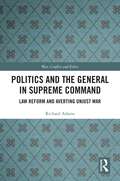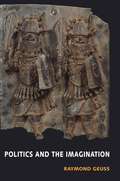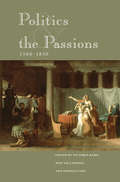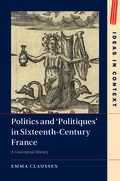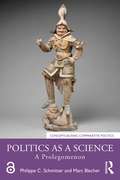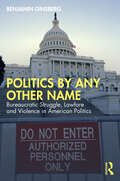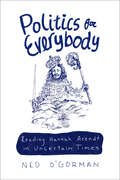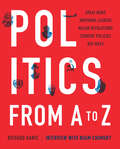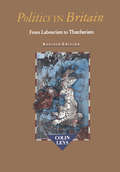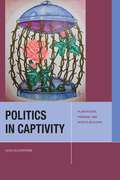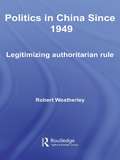- Table View
- List View
Politics and Society in Hungary: (De-)Democratization, Orbán and the EU
by Astrid Lorenz Ellen BosHungary was once a frontrunner of democratization. However, since Viktor Orbán came to power in 2010, the country has been the subject of critical media coverage and concerns due to illiberal policies and anti-EU rhetoric. The book helps to analyze and evaluate the developments by providing relevant case knowledge. It provides sound insights into Hungary’s system of government, society, parties and media, as well as selected policy areas. It focuses on how different policy areas have been influenced by the EU, traces important lines of development over the past decades, and compares the findings with other states of the region. The authors’ professional expertise and broad knowledge of the political systems of Hungary and Europe provide a well-founded analysis of the developments in the region.
Politics and Suicide: The philosophy of political self-destruction (Interventions)
by Nicholas MichelsenPolitics and Suicide argues that whilst the historical lineage of suicidal politics is recognised, the fundamental significance of autodestruction to the political remains under examined. It contends that practices like suicide-bombing do not simply embody a strange or abnormal ‘suicidal’ articulation of the political, but rather, that the existence of suicidal politics tells us something fundamental about the political as such and thinking about political violence more broadly. Recent world events have emphatically shown our need for tools with which to develop better understandings of the politics of suicide. Through the exploration of several arresting case-studies, including the ‘Kamikaze’ bombers of World War Two, Jan Palach’s self-immolation in 1969, Cold War nuclear deterrence, and the suicide-terrorist attacks of 9/11 Michelsen asks how we might talk of a political suicide in any of these contexts. The book charts how political processes ‘go suicidal’, and asks how we might still consider them to be political in such a case. It investigates how suicide can function as ‘politics’. A strong contribution to the fields of philosophy and international relations theory, this work will also be of interest to students and scholars of political theory and terrorism & political violence.
Politics and Theater: The Crisis of Legitimacy in Restoration France, 1815-1830
by Sheryl KroenIn this book, Sheryl Kroen views post-revolutionary France in the years of the Restoration. Following the lead of the French men and women who turned to this play in the 1820s to make sense of their world, Kroen exposes the crisis of legitimacy defining the regime in these years and demonstrates how the people of the time made steps toward a democratic resolution to this crisis.
Politics and Trade in Britain, 1776-1914: Volume I: 1776-1840
by Gordon BannermanThis volume explores the period between Smith’s 1776 The Wealth of Nations and ends in the early days of the Anti-Corn Law League campaign on the eve of the 1841 General Election, which prominently featured contrasting commercial policy options between Conservative and Liberal parties. During this period, we witness the growth of free trade sentiment, with opposition to monopolies like the old Chartered Companies, and attempts to create more liberal bilateral commercial treaties. Most importantly, we see the imposition of the protectionist Corn Laws in 1815 at the behest of a Parliament largely based on the landed interest. Between 1815 and 1846, the Corn Laws become the fulcrum of the entire debate on commercial policy, the ‘keystone in the arch’ of the protective system, and slowly, divisions begin to emerge throughout society and between the political parties, culminating in the formation of the Anti-Corn Law League and their attempt to influence politics via ‘pressure from without’. The sources include printed matter such as the diaries of Lord Colchester; various parliamentary papers on commercial policy; printed correspondence of William Pitt, Lord Melbourne, Joseph Sturge; periodical literature from numerous sources such as the Eclectic Review, and The Oriental Herald. Also included is a considerable body of newspaper material from the Manchester Times, Dundee Advertiser, and The Chartist, reflective of the growing importance of the provinces and manufacturing interests in commercial, and local and national politics.
Politics and Trade in Britain, 1776-1914: Volume II: 1841-1879
by Gordon BannermanThis volume takes up the story of exacerbated political divisions from 1841 onwards, with a clearer demarcation in political life caused at least partly by commercial policy considerations. Ultimately, the success of free trade policies, implemented by Sir Robert Peel after 1841, saw the reconfiguration of political parties and had lasting effects and impact on party politics. Yet in the period up to 1879, there was a broad consensus on maintaining the free trade settlement of 1846. This period, often seen as a ‘free trade interlude’ book-ended by a far more complex range of opinions, policies, and strategies surrounding commercial policy, was characterised by British manufacturing expansion, deeper penetration of foreign and colonial markets, and the adoption of freer trade policies by foreign nations. Ultimately, none of these developments lasted in the long term. By the end of 1879, commercial policy was again controversial. The type of sources in this volume include correspondence from The Panmure Papers, the Later Correspondence of Lord John Russell, and diary material from Lord Ashley and John Bright. There is also a considerable body of material from newspapers, including the Morning Chronicle, Northern Star, Manchester Guardian, and Liverpool Mercury. Manuscript materials from Richard Cobden, John Benjamin Smith, and Lord John Russell among others are also present.
Politics and Trade in Britain, 1776-1914: Volume III: 1880-1914
by Gordon BannermanThe period between 1880 and 1914, the subject of this volume, sees increasing questioning of free trade, especially in those sectors impacted adversely by foreign competition, and within political circles, where the notion of protecting native industries shifted from an agricultural to an industrial base. There was a greater willingness, especially in the Conservative party, to consider it as a viable policy. The ‘constituencies’ or interest groups created by free trade however defended it fiercely among the Liberal party and in manufacturing industries, primarily those highly dependent on export markets. Debates on commercial policy in this period had another dimension which had been subsidiary in earlier periods—the colonial empire and the economic, political, and cultural ties with it promoted. The period between 1880 and 1914 was one where the language of empire was at its height and the economic relationship between the Mother Country and the colonies entered political debate in a forceful way. The sources include several petitions from parliamentary papers attacking the system of commercial treaties pursued by the British government. Towards this end, extracts from the journal Fair Trade, and a body of newspaper material detailing extra-parliamentary movements against free trade, from the Leeds Mercury, Glasgow Herald, Pall Mall Gazette, and Daily Mail, are also included. Making the transition to the early twentieth century and the rise of the labour movement, printed sources such as Fabian tracts on tariff reform, as well as material from the International Free Trade Congress, are incorporated.
Politics and Vision: Continuity and Innovation in Western Political Thought
by Sheldon S. WolinThis is a significantly expanded edition of one of the greatest works of modern political theory. Sheldon Wolin's Politics and Vision inspired and instructed two generations of political theorists after its appearance in 1960. This new edition retains intact the original ten chapters about political thinkers from Plato to Mill, and adds seven chapters about theorists from Marx and Nietzsche to Rawls and the postmodernists. The new chapters, which show how thinkers have grappled with the immense possibilities and dangers of modern power, are themselves a major theoretical statement. They culminate in Wolin's remarkable argument that the United States has invented a new political form, "inverted totalitarianism," in which economic rather than political power is dangerously dominant. In this new edition, the book that helped to define political theory in the late twentieth century should energize, enlighten, and provoke generations of scholars to come. Wolin originally wrote Politics and Vision to challenge the idea that political analysis should consist simply of the neutral observation of objective reality. He argues that political thinkers must also rely on creative vision. Wolin shows that great theorists have been driven to shape politics to some vision of the Good that lies outside the existing political order. As he tells it, the history of theory is thus, in part, the story of changing assumptions about the Good. In the new chapters, Wolin displays all the energy and flair, the command of detail and of grand historical developments, that he brought to this story forty years ago. This is a work of immense talent and intense thought, an intellectual achievement that will endure.
Politics and Vision: Continuity and Innovation in Western Political Thought
by Wendy Brown Sheldon S. WolinPolitics and Vision is a landmark work by one of the great thinkers of the twentieth century. This is a significantly expanded edition of one of the greatest works of modern political theory. Sheldon Wolin's Politics and Vision inspired and instructed two generations of political theorists after its appearance in 1960. Substantially expanded for republication in 2004, it is both a sweeping survey of Western political thought and a powerful account of contemporary predicaments of power and democracy. In lucid and compelling prose, Sheldon Wolin offers original, subtle, and often surprising interpretations of political theorists from Plato to Rawls. Situating them historically while sounding their depths, he critically engages their diverse accounts of politics, theory, power, justice, citizenship, and institutions. The new chapters, which show how thinkers have grappled with the immense possibilities and dangers of modern power, are themselves a major theoretical statement. They culminate in Wolin's remarkable argument that the United States has invented a new political form, "inverted totalitarianism," in which economic rather than political power is dangerously dominant. In this expanded edition, the book that helped to define political theory in the late twentieth century should energize, enlighten, and provoke generations of scholars to come. Wolin originally wrote Politics and Vision to challenge the idea that political analysis should consist simply of the neutral observation of objective reality. He argues that political thinkers must also rely on creative vision. Wolin shows that great theorists have been driven to shape politics to some vision of the Good that lies outside the existing political order. As he tells it, the history of theory is thus, in part, the story of changing assumptions about the Good. Acclaimed as a tour de force when it was first published, and a major scholarly event when the expanded edition appeared, Politics and Vision will instruct, inspire, and provoke for generations to come.
Politics and the Art of Commemoration: Memorials to struggle in Latin America and Spain (Interventions)
by Katherine HiteMemorials are proliferating throughout the globe. States recognize the political value of memorials: memorials can convey national unity, a sense of overcoming violent legacies, a commitment to political stability or the strengthening of democracy. Memorials represent fitful negotiations between states and societies symbolically to right wrongs, to recognize loss, to assert distinct historical narratives that are not dominant. This book explores relationships among art, representation and politics through memorials to violent pasts in Spain and Latin America. Drawing from curators, art historians, psychologists, political theorists, holocaust studies scholars, as well as the voices of artists, activists, and families of murdered and disappeared loved ones, Politics and the Art of Commemoration uses memorials as conceptual lenses into deep politics of conflict and as suggestive arenas for imagining democratic praxis. Tracing deep histories of political struggle and suggesting that today’s commemorative practices are innovating powerful forms of collective political action, this work will be of great interest to students and scholars of international relations, Latin American studies and memory studies.
Politics and the Concept of the Political: The Political Imagination
by James WileyA recent trend in contemporary western political theory is to criticize it for implicitly trying to "conquer," "displace" or "moralize" politics. James Wiley’s book takes the "next step," from criticizing contemporary political theory, to showing what a more "politics-centered" political theory would look like by exploring the meaning and value of politics in the writings of Max Weber, Carl Schmitt, Paul Ricoeur, Hannah Arendt, Sheldon Wolin, Claude Lefort, and Ernesto Laclau and Chantal Mouffe. These political theorists all use the concept of "the political" to explain the value of politics and defend it from its detractors. They represent state-centered, republic-centered and society-centered conceptions of politics, as well as realist, authoritarian, idealist, republican, populist and radical democratic traditions of political thought. This book compares these theorists and traditions of "the political" in order to defend politics from its critics and to contribute to the development of a politics-centered political theory. Politics and the Concept of the Political will be a useful resource to general audiences as well as to specialists in political theory.
Politics and the Earthly City in Augustine's City of God
by Veronica Roberts OgleIn this volume, Veronica Roberts Ogle offers a new reading of Augustine's political thought as it is presented in City of God. Focusing on the relationship between politics and the earthly city, she argues that a precise understanding of Augustine's vision can only be reached through a careful consideration of the work's rhetorical strategy and sacramental worldview. Ogle draws on Christian theology and political thought, moral philosophy, and semiotic theory to make her argument. Laying out Augustine's understanding of the earthly city, she proceeds by tracing out his rhetorical strategy and concludes by articulating his sacramental vision and the place of politics within it. Ogle thus suggests a new way of determining the status of politics in Augustine's thought. Her study clarifies seemingly contradictory passages in his text, highlights the nuance of his position, and captures the unity of his vision as presented in City of God.
Politics and the Environment: From Theory to Practice
by Graham Smith David Benson James Connelly Clare SaundersPolitics and the Environment has established itself as one of the most comprehensive textbooks in this area. This new edition has been completely revised and updated whilst retaining the features and the theory-to-practice focus which made the first two editions so successful. This text is designed to introduce students to the key concepts and issues which surround environmental problems and their political solutions. The authors investigate the people, movements and organisations that form and implement these policies, and explore the barriers which hinder successful introduction of international environmental politics. The 3rd edition has been expanded to include: The shift in focus in environmental politics from sustainable development to climate change governance An extensive discussion on climate change: including institutional, national and global responses in the aftermath of the Kyoto protocol An increased international focus with more case studies from the UK, Europe, Australia and North America More discussion of global environmental social movements: including the US environmental organisations, in particular the Green Party and the environmental justice groups This textbook is an invaluable and accessible resource for undergraduates studying environmental politics.
Politics and the General in Supreme Command: Law Reform and Averting Unjust War (War, Conflict and Ethics)
by Richard AdamsThis book argues for reform of the convention that, when politicians decide on a course of action, the general in supreme command obeys without question.The entire spread‑out chain of command is unified in the general, who offers the only connection between the military and politics. Offering the sole connection between the military and politics, only the general can turn political directions into military command and capacitate war. Thus, the general has unique opportunity to resist unconscionable direction to launch an unjust war or to conduct or expand war unjustly. This book argues for reform, so the general has the right in law to refuse direction which is lawful, but awful. The legal capacity to refuse would mean the general would be expected to act responsibly, not merely as the unresisting pawn of politics. Such reform, creating legal opportunity for the supreme command to refuse lawful but unconscionable directives, might avert unjust war.This book will be of much interest to students of the ethics of war, civil‑military relations, and international relations.
Politics and the Imagination
by Raymond GeussIn politics, utopians do not have a monopoly on imagination. Even the most conservative defenses of the status quo, Raymond Geuss argues, require imaginative acts of some kind. In this collection of recent essays, including his most overtly political writing yet, Geuss explores the role of imagination in politics, particularly how imaginative constructs interact with political reality. He uses decisions about the war in Iraq to explore the peculiar ways in which politicians can be deluded and citizens can misunderstand their leaders. He also examines critically what he sees as one of the most serious delusions of western political thinking--the idea that a human society is always best conceived as a closed system obeying fixed rules. And, in essays on Don Quixote, museums, Celan's poetry, Heidegger's brother Fritz, Richard Rorty, and bourgeois philosophy, Geuss reflects on how cultural artifacts can lead us to embrace or reject conventional assumptions about the world. While paying particular attention to the relative political roles played by rule-following, utilitarian calculations of interest, and aspirations to lead a collective life of a certain kind, Geuss discusses a wide range of related issues, including the distance critics need from their political systems, the extent to which history can enlighten politics, and the possibility of utopian thinking in a world in which action retains its urgency.
Politics and the Passions, 1500-1850
by Victoria Kahn ; Neil Saccamano & Daniela ColiFocusing on the new theories of human motivation that emerged during the transition from feudalism to the modern period, this is the first book of new essays on the relationship between politics and the passions from Machiavelli to Bentham. Contributors address the crisis of moral and philosophical discourse in the early modern period; the necessity of inventing a new way of describing the relation between reflection and action, and private and public selves; the disciplinary regulation of the body; and the ideological constitution of identity. The collection as a whole asks whether a discourse of the passions might provide a critical perspective on the politics of subjectivity. Whatever their specific approach to the question of ideology, all the essays reconsider the legacy of the passions in modern political theory and the importance of the history of politics and the passions for modern political debates. Contributors, in addition to the editors, are Nancy Armstrong, Judith Butler, Riccardo Caporali, Howard Caygill, Patrick Coleman, Frances Ferguson, John Guillory, Timothy Hampton, John P. McCormick, and Leonard Tennenhouse.
Politics and the Search for the Common Good
by Hans SlugaRethinking politics in a new vocabulary, Hans Sluga challenges the firmly held assumption that there exists a single common good which politics is meant to realize. He argues that politics is not a natural but a historical phenomenon, and not a single thing but a multiplicity of political forms and values only loosely related. He contrasts two traditions in political philosophy: a 'normative theorizing' that extends from Plato to John Rawls and a newer 'diagnostic practice' that emerged with Marx and Nietzsche and has found its three most prominent twentieth-century practitioners in Carl Schmitt, Hannah Arendt, and Michel Foucault. He then examines the sources of diagnostic political thinking, analyzes its achievements, and offers a critical assessment of its limitations. His important book will be of interest to a wide range of upper-level students and scholars in political philosophy, political theory, and the history of ideas.
Politics and ‘Politiques' in Sixteenth-Century France: A Conceptual History (Ideas in Context #134)
by Emma ClaussenDuring the French Wars of Religion, the nature and identity of politics was the subject of passionate debate and controversy. The word 'politique', in both sixteenth-century and contemporary French, refers to the theory and practice of politics - 'la politique' - and the statesman or politician - 'le politique' - who theorised and practised this art. The term became invested with significance and danger in early modern France. Its mobilisation in dialogues, treatises, debates, and polemics of the French Wars of Religion was a crucial feature of sixteenth-century experiences of the political. Emma Claussen investigates questions of language and power over the course of a tumultuous century, when politics, emerging as a discipline in its own right, seemed to offer a solution to civil discord but could be fatally dangerous in the wrong hands. By placing this important term in the context of early modern political, doctrinal and intellectual debates, Emma Claussen demonstrates how politics can be understood in relation to the wider linguistic and conceptual struggles of the age, and in turn influenced them.
Politics as Radical Creation
by Christopher HolmanPolitics as Radical Creation examines the meaning of democratic practice through the critical social theory of the Frankfurt School. It provides an understanding of democratic politics as a potentially performative good-in-itself, undertaken not just to the extent that it seeks to achieve a certain extrinsic goal, but also in that it functions as a medium for the expression of creative human impulses. Christopher Holman develops this potential model through a critical examination of the political philosophies of Herbert Marcuse and Hannah Arendt.Holman argues that, while Arendt and Marcuse's respective theorizations each ultimately restrict the potential scope of creative human expression, their juxtaposition - which has not been previously explored - results in a more comprehensive theory of democratic existence, one that is uniquely able to affirm the creative capacities of the human being. Yielding important theoretical results that will interest scholars of each theorist and of theories of democracy more generally, Politics as Radical Creation provides a valuable means for rethinking the nature of contemporary democratic practice.
Politics as a Science: A Prolegomenon (Conceptualising Comparative Politics)
by Philippe C. Schmitter Marc BlecherIn Politics as a Science, two of the world's leading authorities on Comparative Politics, Philippe C. Schmitter and Marc Blecher, provide a lively introduction to the concepts and framework to study and analyze politics. Written with dexterity, concision and clarity, this short text makes no claim to being scientific. It contains no disprovable hypotheses, no original collection of evidence and no search for patterns of association. Instead, Schmitter and Blecher keep the text broadly conceptual and theoretical to convey their vision of the sprawling subject of politics. They map the process in which researchers try to specify the goal of the trip, some of the landmarks likely to be encountered en route and the boundaries that will circumscribe the effort. Examples, implications and elaborations are included in footnotes throughout the book. Politics as a Science is an ideal introduction for anyone interested in, or studying, comparative politics. “The Open Access version of this book, available at http://www.taylorfrancis.com/doi/view/10.4324/9781003032144, has been made available under a Creative Commons Attribution-Non Commercial-No Derivatives 4.0 license.”
Politics by Any Other Name: Bureaucratic Struggle, Lawfare and Violence in American Politics
by Benjamin GinsbergThis book critiques a modern U.S. political system characterized by the partisan weaponization of bureaucratic systems and institutions.Competition for political power in the United States today is not just about winning elections. Competing political forces attempt to win at the polls, but they do not bet all their chips on electoral outcomes. Each party has built an institutional bastion within portions of the federal bureaucracy. Each party makes use of judicial and criminal proceedings for partisan purposes—a practice dubbed “lawfare” by the national media. And, acting through various surrogates, each party sponsors “violence by proxy,” to achieve its ends. To the extent that political struggles are fought outside the electoral arena, ordinary Americans have little or no voice in public affairs. And, unfortunately, in the United States today, a good deal of political struggle takes place outside the electoral arena.This book will be used in undergraduate and graduate classes in political parties, electoral politics, and in general U.S. government classes.
Politics for Everybody: Reading Hannah Arendt in Uncertain Times
by Ned O'GormanRediscover what politics actually is and what miracles it can achieve—once it’s separated from partisanship, polarization, and pointless yelling.In this age of nearly unprecedented partisan rancor, you’d be forgiven for thinking we could all do with a smaller daily dose of politics. In his provocative and sharp book, however, Ned O’Gorman argues just the opposite: Politics for Everybody contends that what we really need to do is engage more deeply with politics, rather than chuck the whole thing out the window.In calling for a purer, more humanistic relationship with politics—one that does justice to the virtues of open, honest exchange—O’Gorman draws on the work of Hannah Arendt. As a German-born Jewish thinker who fled the Nazis for the United States, Arendt set out to defend politics from its many detractors along several key lines: the challenge of separating genuine politics from distorted forms; the difficulty of appreciating politics for what it is; the problems of truth and judgment in politics; and the role of persuasion in politics. O’Gorman’s book offers an insightful introduction to Arendt’s ideas for anyone who wants to think more clearly and speak more carefully in a time when constructive political functioning is desperately needed.“Animated not just by a theoretical and academic interest in Arendt’s work, but also by a practical intent to change the current manner of seeing politics and improve the quality of citizenship and freedom, as well as the daily art of living together.” —The Review of Politics
Politics from A to Z
by Richard GanisDeepen your understanding of how politics work, and why they matter, with this timely guide. Politics from A to Z provides an up-to-date, thoroughly researched glossary of political topics spanning ancient Greece to contemporary America. Featuring an introductory interview with Noam Chomsky, Politics from A to Z is ideal for anyone interested in politics, from beginners to scholars. With detailed entries, visual references, and useful timelines, Politics from A to Z introduces the influential figures and ideas that have shaped politics, from the American Revolution to Zionism.
Politics in Britain
by Colin LeysControversial when the first edition was published in 1983, Colin Leys' analysis of the changing face of British politics has been confirmed by events of the late 1980s. The second edition, revised throughout, is brought up to date with substantial new material on the Thatcher era.Leys provides a solid body of information on the central topics of British politics--not only the nature of political parties or the evolution of the State, but also the organization of capital and labour, corporatism, the transformations of local democracy, the sphere of law and order, and other areas seldom discussed in more orthodox texts.The book also includes new accounts of Thatcher's program of de-nationalization and of the changes to the Welfare State. Now more relevant than ever, Politics in Britain has yet to be surpassed as an introduction to its subject.
Politics in Captivity: Plantations, Prisons, and World-Building (Just Ideas)
by Lena ZuckerwiseFrom the 1811 German Coast Slave Rebellion to the 1971 Attica Prison Uprising, from the truancy of enslaved women to the extreme self-discipline exercised by prisoners in solitary confinement, Black Americans have, through time, resisted racial regimes in extraordinary and everyday ways. Though these acts of large and small-scale resistance to slavery and incarceration are radical and transformative, they have often gone unnoticed. This book is about Black rebellion in captivity and the ways that many of the conventional well-worn constructs of academic political theory render its political dimensions obscure and indiscernible. While Hannah Arendt is an unlikely theorist to figure prominently in any discussion of Black politics, her concepts of world and worldlessness offer an indispensable framework for articulating a theory of resistance to chattel and carceral captivity. Politics in Captivity begins by taking seriously the ways in which slavery and incarceration share important commonalities, including historical continuity. In Zuckerwise’s account of this commonality, the point of connection between enslaved and incarcerated people is not exploited labor, but rather resistance. The relations between the rebellions of both groups appear in the writings of Muhammed Ahmad, Angela Davis, George Jackson, Ruchell Magee, and Assata Shakur, a genre Zuckerwise calls Black carceral political thought. The insights of these thinkers and activists figure into Zuckerwise’s analyses of largescale uprisings and quotidian practices of resistance, which she conceives as acts of world-building, against conditions of forced worldlessness. In a moment when a collective racial reckoning is underway; when Critical Race Theory is a target of the Right; when prison abolition has become more prominent in mainstream political discourse, it is now more important than ever to look to historical and contemporary practices of resistance to white domination.
Politics in China since 1949: Legitimizing Authoritarian Rule (Routledge Contemporary China Series #Vol. 11)
by Robert WeatherleySince the victory of the 1949 revolution the incumbency of the Chinese Communist Party has been characterized by an almost relentless struggle to legitimize its monopoly on political power. During the Mao era, attempts to derive legitimacy focused primarily on mass participation in political affairs, a blend of Marxist and nationalist ideology, and the charismatic authority of Mao Zedong. The dramatic failure of the Cultural Revolution forced the post-Mao leadership to discard these discredited paradigms of legitimacy and move towards an almost exclusively performance based concept founded on market economic reform. The reforms during the 1980s generated a number of unwelcome but inevitable side effects such as official corruption, high unemployment and significant socio-economic inequality. These factors culminated ultimately in the 1989 demonstrations in Tiananmen Square and throughout China. Since Tiananmen the party has sought to diversify the basis of its legitimacy by adhering more closely to constitutional procedures in decision making and, to a certain extent, by reinventing itself as a conservative nationalist party. This probing study of post-communist revolution Chinese politics sets out to discover if there is a plausible alternative to the electoral mode or if legitimacy is the exclusive domain of the multi-party system.
